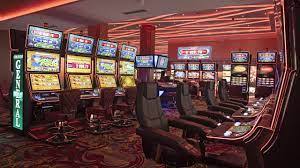

What are the top 10 most surprising statistics about the global gambling industry this year?
Although I don’t have real-time data, I can provide you with some surprising statistics about the global gambling industry in recent years. Please note that these figures might not be specific to this year:
1. The global gambling industry is estimated to be worth over $400 billion annually.
2. Nearly 4.2 billion people worldwide gamble at least once a year.
3. Asia-Pacific is the largest gambling market, accounting for almost 50% of global gambling revenue.
4. In 2019, the United States became the largest single gambling market for the first time due to the legalization of sports betting.
5. Online gambling is rapidly growing and accounts for around 10% of the global gambling market.
6. According to a study in 2020, the annual revenue from illegal sports betting globally is estimated to range from $150 billion to $400 billion.
7. Lotteries make up a significant proportion of the gambling industry, with lottery sales reaching roughly $300 billion annually.
8. Casino gambling stands as the most popular sector, with over 50% of global gambling revenue generated by casinos.
9. Mobile gambling is on the rise, constituting a significant portion of online gambling revenue.
10. The global gambling industry employs millions of people, supporting jobs in areas such as hospitality, tourism, and entertainment.
Please be aware that these statistics may change over time.

What are the top 10 milestones in women’s participation in poker tournaments?
1. 1977: Barbara Freer becomes the first woman to cash in the World Series of Poker (WSOP) Main Event, finishing in 5th place.
2. 1995: Barbara Enright becomes the first woman to reach the WSOP Main Event final table, finishing in 5th place.
3. 2000: Jennifer Harman becomes the first woman to win multiple WSOP bracelets.
4. 2003: Annie Duke becomes the first woman to win the WSOP Tournament of Champions.
5. 2004: Kathy Liebert becomes the first woman to win a million-dollar prize in a poker tournament, winning the inaugural PartyPoker Million Cruise.
6. 2005: Jennifer Tilly becomes the first woman to win a WSOP bracelet in an open event, not restricted to women only (the Ladies Event).
7. 2007: Vanessa Selbst becomes the highest-earning female player in tournament poker, with over $10 million in live tournament winnings.
8. 2012: Vanessa Selbst becomes the first woman to win back-to-back North American Poker Tour (NAPT) Main Event titles.
9. 2014: Liv Boeree becomes the first woman to win the European Poker Tour (EPT) Main Event, winning over €1.25 million.
10. 2018: Maria Lampropulos becomes the first woman to win the PokerStars Caribbean Adventure Main Event, earning $1,081,100.

What are the top 10 gambling companies making the biggest push for environmental sustainability?
1. MGM Resorts International – MGM Resorts has committed to reducing its carbon emissions and has implemented several sustainable practices across its operations. It has set goals to reduce greenhouse gas emissions, increase energy efficiency, and conserve water.
2. Caesars Entertainment – Caesars Entertainment has a strong commitment to environmental sustainability. The company has implemented energy-saving initiatives, waste reduction, and water conservation efforts. It also focuses on sustainable sourcing, recycling, and responsible waste management.
3. Las Vegas Sands – Las Vegas Sands is dedicated to sustainable practices and reducing its environmental impact. The company has implemented energy efficiency measures, such as installing LED lighting and optimizing HVAC systems. It also prioritizes responsible waste management and recycling.
4. Paddy Power Betfair – Paddy Power Betfair has made efforts to promote sustainability in its operations. The company focuses on reducing energy consumption, water conservation, and waste management. It has also implemented recycling programs and encourages sustainable practices among its employees.
5. William Hill – William Hill has taken significant steps towards sustainability in recent years. The company aims to reduce its carbon footprint through energy-efficient measures in its offices and retail outlets. It also focuses on responsible waste management and recycling.
6. Genting Group – Genting Group places importance on sustainability and environmental conservation. The company has implemented energy-saving technologies, such as solar panels, across its properties. It also emphasizes recycling and waste reduction.
7. Melco Resorts & Entertainment – Melco Resorts & Entertainment takes a proactive approach to sustainability. The company has implemented various energy-saving measures, including LED lighting and efficient HVAC systems. It also emphasizes responsible waste management and recycling.
8. Kindred Group – Kindred Group places a strong emphasis on environmental sustainability. The company aims to reduce its carbon footprint, increase energy efficiency, and utilize renewable energy sources. It also supports local environmental initiatives and promotes responsible waste management.
9. GVC Holdings – GVC Holdings is committed to addressing environmental challenges and promoting sustainability. The company has implemented energy-efficient measures, such as optimizing lighting and heating systems. It emphasizes recycling, responsible waste management, and sustainable sourcing.
10. Flutter Entertainment – Flutter Entertainment has made efforts to integrate sustainable practices into its operations. The company focuses on reducing its carbon emissions and energy consumption. It also emphasizes responsible waste management and recycling initiatives.

What are the top 10 developments in responsible gambling tools on online platforms?
1. Self-exclusion programs: Online gambling platforms have implemented self-exclusion options that allow users to voluntarily exclude themselves from accessing gambling services for a specified period. They can also block themselves from multiple platforms simultaneously.
2. Deposit limits: Online gambling platforms now provide users with the option to set deposit limits, which restrict the amount of money they can deposit within a specific time frame. This helps prevent excessive gambling and potential financial harm.
3. Time limits: Responsible gambling tools now allow players to set time limits, helping them manage their gambling sessions and prevent excessive screen time.
4. Reality checks: Gambling platforms now offer reality checks, where players receive notifications after a specified period of active play to remind them of the duration they’ve spent gambling. It helps players maintain awareness of their gambling habits.
5. Activity statements: Online gambling platforms provide players with detailed activity statements that track their gambling behavior, including amounts wagered, time spent, and wins/losses. This feature helps players monitor their gambling activity and make informed decisions.
6. Cooling-off periods: Responsible gambling tools allow players to take a cooling-off period, where they can temporarily suspend their account for a specified duration to take a break from gambling.
7. Enhanced age verification: Online platforms have improved age verification processes to ensure only individuals above the legal gambling age can access gambling services. This helps prevent underage gambling.
8. Responsible advertising: Online gambling operators have developed stricter guidelines and regulations for advertising practices, ensuring responsible messaging and avoiding targeting vulnerable individuals.
9. Access to support resources: Gambling platforms provide easy access to support resources such as helplines, counseling services, and responsible gambling websites. Users can seek help and support whenever needed.
10. Collaborations with support organizations: Online gambling operators actively collaborate with responsible gambling organizations to promote player protection, develop new tools, and share best practices. These collaborations enhance responsible gambling initiatives across online platforms.

What are the top 10 most impactful economic analyses of the gambling industry this year?
Unfortunately, as an AI language model, I don’t have access to real-time data or the ability to browse the internet. Therefore, I can’t provide you with the most recent economic analyses of the gambling industry. However, I can provide a list of some noteworthy economic studies that have been conducted on the gambling industry in general. These analyses may not be specific to this year, but they are considered impactful in understanding the broader economic aspects of the industry. Here are ten influential economic analyses related to the gambling sector:
1. “The Economics of Casino Gambling” by Douglas M. Walker.
2. “The Social and Economic Impacts of Gambling: A Comprehensive Review of the Literature” by William R. Eadington and Judy A. Cornelius.
3. “Economic Aspects of Gambling Regulation: EU and US Perspectives” by Tommi Tuomela and Per Jaldell.
4. “The Socio-Economic Impact of Gambling” by Ricardo Gazel.
5. “The Economics of Gambling and National Lotteries” by Leighton Vaughan Williams and David Paton.
6. “The Impact of Casino Gambling on Personal Bankruptcy Rates” by Karel G.M.D. Croes and Marketa Pechrova.
7. “Measuring the Effects of Casinos on Local Economies: Applied Economic Analysis Techniques” by Lesley Ziolkowski and Rodney B. Warnick.
8. “The Economic Geography of Gambling: A Critical Review” by Steven Brakman and Charles van Marrewijk.
9. “The Economics of Offshore Betting: Evidence from Gambling on Chinese Social Media Platforms” by David Forrest, J.D. Forrest, and Keith T. H. Forde.
10. “Assessing gambling-related harm in Victoria: A public health perspective” by Charles Livingstone, Peter Adams, and Marisa Fogarty.
These are a few examples of impactful economic analyses on the gambling industry, but the field is continuously evolving, and new studies are being carried out regularly. For the most up-to-date economic analyses, it would be advisable to consult academic journals, industry reports, or economic research institutions.

What are the top 10 predictions for the future of the gambling industry?
1. Increasing dominance of online gambling: With advancements in technology and the growing popularity of online platforms, the gambling industry will see a significant shift from physical casinos to online platforms.
2. Rise of mobile gambling: Mobile devices will become the primary platform for gambling, with more users accessing gambling apps and websites through smartphones and tablets.
3. Virtual and augmented reality gambling experiences: Virtual reality (VR) and augmented reality (AR) technologies will revolutionize the gambling industry, offering immersive and realistic experiences to players.
4. Cryptocurrency integration: As digital currencies gain wider acceptance, the gambling industry will witness increased integration of cryptocurrencies like Bitcoin, allowing for faster and more secure transactions.
5. Strict regulation and increased compliance measures: Governments and regulatory bodies will implement stricter regulations to ensure consumer protection, fairness, and responsible gambling practices.
6. Expansion of sports betting: The popularity of sports betting will continue to rise, with more countries legalizing and regulating this form of gambling.
7. Inclusion of esports betting: Esports betting will gain traction, as competitive video gaming becomes a mainstream entertainment activity, offering new opportunities for the gambling industry.
8. Personalized gaming experiences: Casinos and online platforms will leverage data analytics and machine learning to personalize gaming experiences, tailoring offers and games based on each player’s preferences and behaviors.
9. Gamification of gambling: Casinos will incorporate elements of gamification, such as leveling up, achievements, and rewards, to enhance player engagement and retention.
10. Integration of artificial intelligence: Artificial intelligence technologies will be utilized to improve customer service, detect problem gambling behaviors, and enhance game algorithms to provide fair and enjoyable experiences.

What are the top 10 advancements in customer behavior analysis in the gambling industry?
1. Big Data and Analytics: The gambling industry has witnessed significant advancements in the collection and analysis of large volumes of customer data. This allows for more accurate and insightful customer behavior analysis.
2. Predictive Modeling: Through the use of predictive modeling techniques, the industry can anticipate customer behavior patterns and make data-driven decisions.
3. Machine Learning: By leveraging machine learning algorithms, gambling operators can identify complex patterns and trends in customer behavior, enabling personalized marketing and tailored experiences.
4. Sentiment Analysis: Natural language processing techniques now allow for sentiment analysis of customer feedback, enabling gambling operators to understand and respond to their customers’ emotions and preferences.
5. Social Media Listening: Monitoring and analyzing customer conversations on social media platforms provide valuable insights into their motivations, opinions, and behaviors in relation to gambling products and services.
6. Gamification: The use of gamification elements in analyzing customer behavior enables gambling operators to engage and incentivize customers, driving loyalty and increasing their time and spend on the platform.
7. Real-time Behavioral Tracking: Advanced tracking technologies allow operators to capture and analyze customer behavior in real-time. This means personalized recommendations, promotions, and interventions can be offered in the moment.
8. Segmentation and Customer Profiling: The ability to segment and profile customers based on their behavior traits and preferences has become more sophisticated. This helps operators tailor offerings and communications to specific customer segments.
9. Mobile and App-Tracking: The rise of mobile gambling has allowed for detailed tracking of customer behavior on gambling apps. This data can be used to provide personalized experiences and real-time interventions.
10. Ethical and Responsible Gambling Analysis: Advances in customer behavior analysis are also helping to identify signs of gambling addiction and problem behavior. This enables operators to intervene early and provide appropriate support for responsible gambling initiatives.

What are the top 10 initiatives for attracting a younger audience to casinos?
1. Modernizing the gaming experience: Updating casino games and technology to appeal to younger generations, including integrating digital and virtual reality elements, interactive and skill-based games, and esports betting.
2. Developing a vibrant entertainment scene: Offering a wide range of live performances, concerts, comedy shows, and other events that cater to the interests and tastes of younger audiences.
3. Creating a trendy and social atmosphere: Designing casino spaces to be more hip and stylish, with modern décor, trendy bars, lounges, and social gathering areas for networking and socializing.
4. Offering diverse dining options: Providing a variety of affordable and appealing dining choices, including trendy restaurants, food trucks, and innovative food concepts that align with younger tastes and dietary preferences.
5. Implementing loyalty programs and rewards: Developing innovative loyalty programs that offer personalized rewards, exclusive experiences, and benefits specifically tailored to attract and retain younger audiences.
6. Hosting gaming tournaments and competitions: Organizing regular gaming competitions and tournaments, particularly for popular games and esports, that allow younger players to showcase their skills and compete for prizes and recognition.
7. Introducing interactive promotions and gamification: Implementing gamification features such as leaderboards, badges, and challenges that engage younger players and incentivize them to explore different areas of the casino and participate in various games and activities.
8. Promoting social responsibility and community involvement: Demonstrating corporate social responsibility by actively supporting local charities, community initiatives, and environmental sustainability causes, which resonate with the younger generation’s values.
9. Leveraging social media and influencers: Utilizing social media platforms and partnering with influential personalities, content creators, and celebrities popular among younger demographics to drive awareness and engagement with the casino brand.
10. Providing educational and interactive experiences: Offering workshops, classes, and interactive experiences that teach younger audiences about gaming strategies, casino etiquette, and responsible gambling practices, fostering a sense of inclusion and learning.

What are the top 10 emerging threats to the global gambling industry?
1. Cybersecurity risks: The gambling industry is increasingly targeted by cybercriminals, who seek to exploit vulnerabilities in online platforms and steal sensitive customer data or manipulate games.
2. Regulatory changes: Governments worldwide are continuously updating their regulations concerning gambling, which can create uncertainties and impact revenue and operations for the industry.
3. Money laundering: Criminals often use the gambling industry as a means to launder large sums of money. Regulators are becoming more vigilant in enforcing anti-money laundering measures, and stricter controls are being implemented.
4. Problem gambling: The increasing prevalence of problem gambling raises concerns around ethical responsibilities and potential legal ramifications for gambling operators.
5. Competition from illegal gambling: Illegal gambling operations, including online platforms and underground betting networks, pose a threat to the licensed and regulated gambling industry. These unregulated entities often offer attractive odds and can siphon revenue away from legitimate operators.
6. Technological disruptions: Advancements in technology such as virtual reality, augmented reality, and cryptocurrencies have the potential to disrupt traditional gambling models and force the industry to adapt quickly.
7. Adverse economic conditions: Economic downturns can impact consumer spending on gambling, leading to lower revenue for the industry.
8. Changing consumer preferences: Shifts in consumer behavior, such as a preference for mobile gambling over traditional land-based casinos, can pose challenges for the industry that must adapt to evolving tastes and demands.
9. Responsible gambling regulations: Governments are increasingly focused on implementing measures to protect gamblers from developing gambling addictions, which can include restrictions on advertising, limits on betting amounts, and mandatory responsible gambling tools.
10. Geopolitical risks: Political instability, changes in government, or shifting international relations can introduce uncertainties and potential disruptions for the global gambling industry, particularly in regions heavily reliant on tourism and gambling revenue.

What are the top 10 most successful gamification strategies in online gambling platforms?
1. Loyalty programs: These programs reward players with points or bonuses based on their activity and encourage them to keep playing.
2. Leaderboards: Leaderboards rank players based on their performance, creating a sense of competition and motivating players to improve.
3. Achievements and badges: By offering virtual achievements and badges, players are motivated to complete specific tasks or milestones within the game.
4. Challenges and quests: Providing players with challenging objectives or quests gives them a sense of purpose and accomplishment.
5. Social interaction: Adding social features like chat, multiplayer modes, and friend lists allows players to connect with others, fostering a sense of community and enhancing the gaming experience.
6. Progress bars and levels: Incorporating progress bars or leveling systems keeps players engaged by visually showing their advancement and unlocking new features or content.
7. Personalization: Online gambling platforms that allow players to customize their avatars, themes, or game settings provide a more tailored experience, increasing player satisfaction.
8. Tournaments and competitions: Hosting time-limited tournaments or competitions encourages players to participate and win prizes, boosting engagement and excitement.
9. Daily bonuses and rewards: Offering daily bonuses, free spins, or other rewards keeps players coming back regularly and enhances retention.
10. Virtual currencies and in-game purchases: Introducing virtual currencies, which can be earned or bought, and offering in-game purchases like cosmetic items or power-ups adds a layer of engagement and monetization to the platform.




